- Submissions

Full Text
COJ Electronics & Communications
The Factors Which Influencing Users’ Behavioral Intention Towards Using Online Booking System for Car Service at Car Service Centre in Malacca
Mohd Fazli Mohd Sam* and Siti Nurrazma Farhana Baharin
Faculty of Technology Management and Technopreneurship, Malaysia
*Corresponding author: Mohd Fazli Mohd Sam, Faculty of Technology Management & Technopreneurship, Malaysia
Submission: October 15, 2018;Published: November 20, 2018
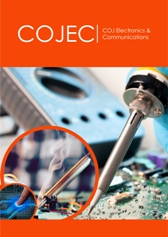
ISSN 2640-9739 Volume1 Issue4
Abstract
In today’s global age, online booking system has been used by many industries from hotel, tourism and airlines. Online booking system is viewed as a systematic process for the company to enhance their organizational performance. This study investigated the factors which influencing the users’ acceptance towards using online booking system for car service centre. Survey data was collected from 384 respondents were analyzed using Statistical Package for the Social Science (SPSS 15.0). The findings were obtained based on the key constructs from UTAUT 2 which are performance expectancy, effort expectancy, social influence, facilitating conditions, hedonic motivation, price value and behavioral intention. This study objective is to find the factors which influence the users’ acceptance towards new technology for booking appointment. The results of this study can be useful to understand users’ acceptance from new perspective which can be used by authorized car service centre.
Introduction
With the use of the Internet, people can access the information easily and make the reservation online. The revolution of the Internet has transformed the service transaction from direct contact to online service exchange [1]. Recently, booking services have transformed from manual to online service even in the area that has not yet been penetrated by digitization [2] for instance, booking a hotel or flight online has become “habitual” Khare and Handa [3]. Since many people have recognized the importance of going online, business around the world starts to give their attention on the virtual business environment to improve their competitive advantage (Sam and Tahir, 2009). This is because online service can offer the user with low cost, more convenience and greater accessibility for service by removing time and space barriers Rust [1]. While many industries have started to apply online booking system, the automobile industry has started to offer online booking. Automotive industry is related to many aspects of car ownership, which the product must come up with after sale service since maintenance has become a service that comes intact with the car sales, which usually is offered through the authorized service centre [4].
The automotive industry plays an important role in daily activities, not just providing the transportation but also important for economic, social and environmental activities around the world [5]. The significant growth in the number of vehicles registration and licensed drivers has caused the huge demand for motor vehicle repair and service industry in Malaysia (Malaysian Road Transport Department, 2013). Some of automobile company have started to implement online booking system for car users since Malaysia has reached about half a million units per year for new car sales with 10 million unit of existing cars already in the community [6]. However, most car service centre in Malaysia specifically in Malacca still use the manual booking system where the customers have to wait and call the operators to book a date for car service. The manual booking system is time and energy consuming, this process is not efficient especially for a big and well-known company [7]. The limitation for manual booking system also because of the office only operates during office hour and the reservation can only be made at that time.
From the perspective of new technology, many researchers have studied by using theoretical theory to explain users’ behavioral intention of new technologies Kucukusta 2015; Davis and Venkatesh 1996. Various researchers have proposed mixed theories to determine what is the user’s intention towards the usage and behavioral intention of Internet technology. Most theories state that the behavioral intention of a technology is determined more by the attitude and behavior of the users themselves rather than the technology characteristics Kim 2009, Kim and Garrison 2010, Jang and Noh 2011, Chang and Yang 2013.
The researcher intends to understand the factors that influence the behavioral intention towards using online booking system for car service centre in Malacca by using 7 constructs from UTAUT 2 which are performance expectancy, effort expectancy, social influence, facilitating condition, hedonic motivation, price value and habit to investigate the relationship with users’ behavioral intention. The following factors have been widely used by various researchers for new technology behavioral intention Dwivedi 2017. This research will review the factors which influence users’ behavioral intention towards new online booking system for car service by using UTAUT 2 model.
Literature Review
Overview on automotive industry in Malaysia
Automotive industry in Malaysia is vital for the country manufacturing and economy sector Industry 2014. There are around 710,000 people are employed during 2014 in automotive industry and almost RM30 billion was contributed to Malaysia’s GDP Industry 2014. In Southeast Asia, Malaysia is one of the representatives for the biggest automobile markets Nasir 2004 which comprises of 27 car producers and more than 640 component manufactures. Automotive industry in Malaysia started during British Malayan colonial era where Ford Malaya has turned into the first car assembly plant in Southeast Asia upon its foundation in Singapore in 1926. Since 1985, Malaysia has their own first-made- In-Malaysia car, Proton then followed by Perodua in 1993. In 2002, Malaysia become the 11th country in the world that has capability to full design and manufacture cars through Proton production Wikipedia 2017.
Car service centre
There are two types of car service centre which is the authorized car service centre and the other is the independent garage Rajalakshmi and Singh 2017. There are some differences of the services provided by the authorized service centre and the local garage. Usually, authorized car service is more organized since everyone in the service chain has their own duties and responsibilities. The service provided by authorized car service centre should be at the highest level from communication and information transfer Igor, Darko and Aleksandar 2013. According to Igor, Darko and Alexander 2013, found that many car owners are satisfied with the aspect for appointment at the authorized car service centre. This study intends to explore the users’ behavioral intention towards authorized car service centre in Malacca.
Manual booking system at car service centre
Currently, there are some authorized car service centre in Malacca still run a manual booking system. Only few car service centre have implemented online booking system for example Proton and Toyota. The manual booking system requires customer to book by calling operators or walk in to the centre for booking sessions. It is quite troublesome since the customers have to wait for the operators to pick up the call. The current service centre use this flow for car maintenance according to Igor, Darko and Aleksandar 2013.
Definition of online booking system
A system where users are allowed to book an appointment via the internet is defined as an online booking system [8]. Online booking is a method to store, publish, and upgrade data availability and prices besides provide consumer a system for reservation Landvogt 2004. With the technology advancement, many businesses have started to offer an online site to gain more customers Chow 2017. Through online site, they can provide their customers with online booking system to enhance the efficiency of the business. There has been a significant growth in online booking for tourism and hospitality, for example online booking for hotel, airline tickets and others because of the convenience to check information and making reservation online.
The extension of unified theory of acceptance and use of technology (UTAUT 2)
Figure 1:The UTAUT 2 model (source retrieved from Venkatesh et al., 2012).
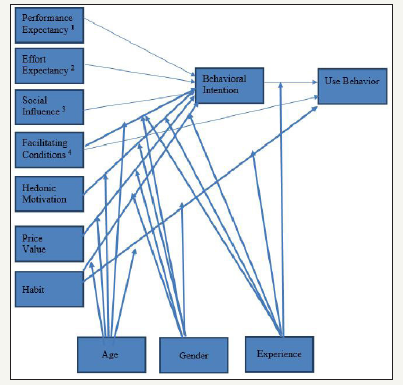
There also research done which suggest the extension of UTAUT by adding hedonic motivation, price and habit for consumers’ technology according to Vekatesh et al. [9]. Thus, as UTAUT2 was improved from previous UTAUT, the researcher intends to use UTAUT2 as a model to explore the factors that influence users’ behavioral intention and use of new technology in automotive industry. However, the moderator will not be used since researcher just want to focus on the factors without considering age, experience, gender and voluntariness of use. Since UTAUT focuses on organization technology behavioral intention, UTAUT 2 was developed to study about the technology behavioral intention from consumer side Kaneberg and Zehra Jönköping 2016; (Figure 1).
Performance expectancy
Performance Expectancy is defined as “the degree to which an individual believes that using the system will give benefits to consumers in doing certain activities.” [9]. Based on the study done by Sulistiyaningsih 2014, the authors stated that when the customers are satisfied with the new technology as it will improve their task performance is considered as perceived usefulness. In addition, it is proved that a consumer is more confident of the usefulness of the technology when it is used frequently and Sulistiyaningsih 2014. In conclusion, it is found that performance expectancy is significant variable which can influence the user’s intention towards the usage of the new technology system [10].
Effort expectancy
Effort expectancy is defined as “the degree of ease associated with the use of the system” [9]. Numerous studies found that effort expectancy has a significant effect on the users’ intention to adopt new technology Alraja 2016; Alraja 2015; Chang 2007; Schaper and Pervan 2007; Gupta 2008; Al-Shaf 2009.
<Social influence
Social influence is defined as the effect of people’s opinion towards individual user behavior Zhou 2011. It also supported by Sona Mardikyan 2012. which found that social influence positively influences the user usage of 3G technology. In this study, the researcher wants to study how the social influence can affect the behavioral intention of user to use online booking system for car service at car service centre in Malacca [11].
Facilitating condition
Facilitating Conditions is considered as “the degree to which an individual believes that an organizational and technical infrastructure exists to support the use of the system” Venkatesh 2003. Based on the research done by Chibaro 2015, the author found from previous research about technology acceptance, that most people would likely to adopt the new technology if they have sufficient and appropriate infrastructure to adopt it [12].
Hedonic motivation
According to Ventakesh et al. [9], hedonic motivation is defined as the fun customers feel from using the technology. HM is defined as “the fun or pleasure derived from using a technology. Previous studies show that hedonic motivation has been validated as important factor for new technology behavioral intention Kaneberg and Zehra Jönköping 2016; Brown and Venkatesh 2005.
Price value
Price value is defined as the monetary costs that customers have to bear when using the technology. Technology for consumers is not given for free, unlike in the organizational context, thus the cost of using the technology might have significant effect on consumer’s intention to use the technology [9]. Usually online booking system are mostly free to be used for customers, but the costs for using online website are the cost of internet, mobile device and also mobile device maintenance Fong and Wong 2015; Wei 2009.
Habit
According to Ventakesh et al. [9], habit is defined as to which extent an individual tends to perform certain behavior because of learning. In this research, the researcher defines habit as the extent to which an individual tends to use online booking for car service centre in Malacca. Study made by Ventakesh et al. [9] also found that habit can influence the behavioral intention of users towards using new technology (Figure 2).
Figure 2:H1: There is significant and positive relationship between performance expectancy and users’ behavioral intention to use online booking system.
H2: There is significant and positive relationship between effort expectancy and users’ behavioral intention to use online booking system for car service.
H3: There is significant and positive relationship between social influence and users’ behavioral intention to use online booking system for car service.
H4: There is significant and positive relationship between facilitating condition and users’ behavioral intention to use online booking system for car service.
H5: There is significant and positive relationship between hedonic motivation and users’ behavioral intention to use online booking system for car service.
H6: There is significant and positive relationship between price value and users’ behavioral intention to use online booking system for car service.
H7: There is significant and positive relationship between habit and users’ behavioral intention to use online booking system for car service.
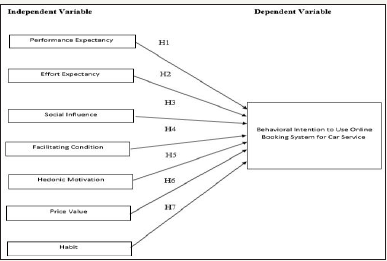
Research Methodology
A total number of 350 respondents will be given the questionnaire about the factors that influence the users’ behavioral intention towards online booking system for car service centre in Malacca. This data collection technique is used to acquire the relevant data and information and at the same time to help authorized car service centre to improve their organizational performance. The respondents were chosen by using probability sampling method.
Discussion
The 350 respondents from car user have been interpreted the results by using SPSS software. Researcher want to study the users’ acceptance towards online booking system for car service by studying the factors that can influence their behavioral intention. So, in demographic part of questionnaire.
Based on Figure 3, it shows that most of the respondents prefer to deliver their car for service at authorized car service centre with 66% (231 respondents), while 34% (119 respondents) prefer to send their car at Independent garage.
Figure 3:Respondent’s preference place for car service.
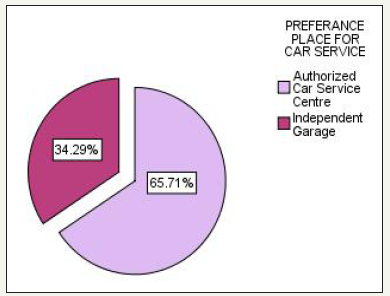
Figure 4:Respondent’s preferred booking process.

Based on Figure 4, it shows that most of the respondents prefer to walk in to the car service centre in order to make a booking process with 48.9% (171 respondents), followed by 41.1% (144 respondents) prefer to use phone call for booking process and least preferred booking process is online booking system, as its still new with only 10% (35 respondents).
Reliability analysis
Reliability analysis is the most widely method used to check the internal consistency. In order to evaluate whether the data is reliable or not, reliability testing must be done for the continuance of the research. Cronbach Alpha is used to check and test the goodness of the data obtained.
Table 1 above showed the Cronbach Alpha for the independent and dependent variables computed to analyze the reliability of this research. The reliability analysis between independent variables (Performance Expectancy, Effort Expectancy, Social Influence, Facilitating Condition, Hedonic Motivation,
Table 1:Reliability test for all variables.

Price Value and Habit) and one dependent variable (behavioral intention). The total respondents of this research which is 350 are chosen to analyze the reliability test. Therefore, from the Table above it indicates that the Cronbach Alpha is 0.962, which is excellent reliability.
Multiple linear regression on all independent variables
Table 2:ANOVAa

Based on the Table 2 above, the p-value is 0.000 is smaller than the alpha value of 0.05. The overall multiple regression models are significant at the 5% level of significant and it is good at describing the relationship between the factors that can influence users’ behavioral intention towards using online booking system for car service at car service centre at Malacca.
Table 3:Correlation analysis.
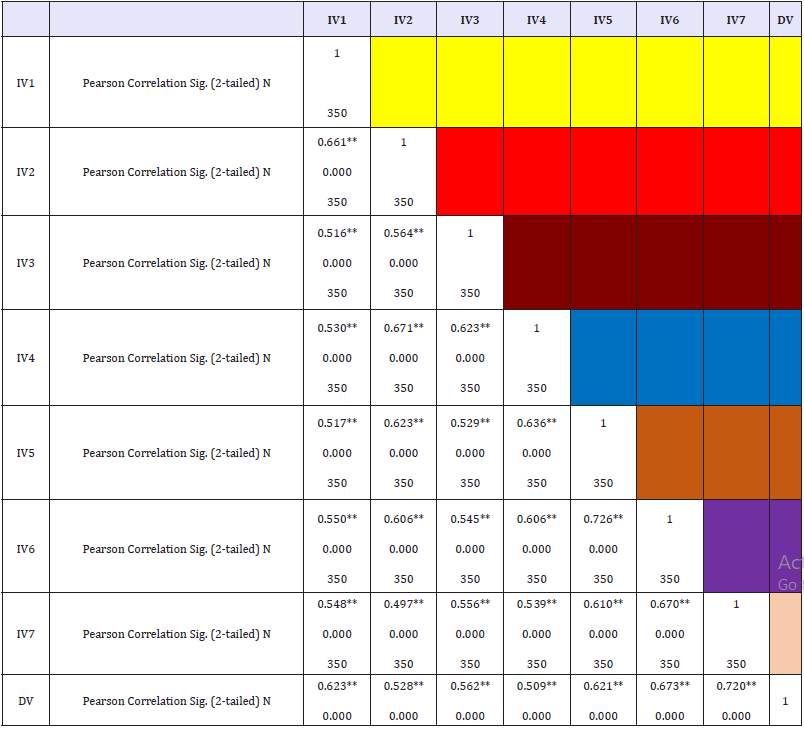
Based on the Table 3 above, the results show all the correlation between independent variables and dependent variable to find the strength of relationship between them. for the first independent variable, the correlation between performance expectancy and behavioral intention is 0.623. this coefficient shows a positive relationship between both variables. The p value of this correlation is 0.000 which is less than 0.05. thus, this correlation coefficient is statistically significant.
Next, for the second independent variable, the correlation between effort expectancy and behavioral intention is 0.582. This coefficient shows a positive relationship between both variables. The p value of this correlation is 0.000 which is less than 0.05. Thus, this correlation coefficient is statistically significant. Based on the results, the correlation between social influence, the third independent variable and behavioral intention is 0.562. Based on coefficient, it shows a positive relationship between social influence and behavioral intention. The p value of this correlation is less than 0.05 which 0.000. Thus, this correlation coefficient is statistically significant.
For the fourth factor which is facilitating condition, the correlation between facilitating condition and behavioral intention is 0.509. Based on coefficient shows a positive relationship between facilitating condition and behavioral intention. The p value of this correlation is 0.000 which less than 0.05. Thus, this correlation coefficient is statistically significant. Based on the results from the Table above, the correlation between hedonic motivation and behavioral intention is 0.621. Based on coefficient, it shows a positive relationship between hedonic motivation and behavioral intention. The p value of this correlation is less than 0.05 which 0.000. Thus, this correlation coefficient is statistically significant.
For the sixth independent variable, the correlation between price value and behavioral intention is 0.673. Based on coefficient, it shows a positive relationship between price value and behavioral intention. The p value of this correlation is less than 0.05 which 0.000. Thus, this correlation coefficient is statistically significant. And lastly, for the last independent variable which is habit, the correlation between habit and behavioral intention is 0.720. Based on coefficient, it shows a positive relationship between habit and behavioral intention. The p value of this correlation is less than 0.05 which 0.000. Thus, this correlation coefficient is statistically significant. Thus, all the independent variable has positive correlation with the dependent variable (Table 4).
Table 4:

Conclusion
As a conclusion, this research addressed the main issue about what are the factors that can influencing users’ behavioral intention towards using online booking system for car service at car service centre in Malacca. the factors are performance expectancy, effort expectancy, social influence, facilitating condition, hedonic motivation, price value and habit. However, from all these seven factors only six factors were accepted as significant in this study which are performance expectancy, effort expectancy, social influence, facilitating condition, price value and habit while hedonic motivation is rejected as the significant value is more than 0.05.
Acknowledgement
This study was supported by Universiti Teknikal Malaysia Melaka (UTeM) and all mistake or errors are the responsibility of the authors.
References
- Mou J, Shin DH, Cohen J (2017) Understanding trust and perceived usefulness in the consumer acceptance of an e-service: a longitudinal investigation. Behaviour and Information Technology 36(2): 125-139.
- Mario S, Björn H (2017) Digital booking services: comparing online with phone reservation services. Journal of Services Marketing 31(7): 704- 719.
- Kaushik AK, Agrawal AK, Rahman Z (2015) Tourist behaviour towards self-service hotel technology adoption: trust and subjective norm as key antecedents. Tourism Management Perspectives 16: 278-289.
- Rafiqah S, Mia TDI, Nurrani K (2016) Assessing customer satisfaction of automotive service centre using SERVQUAL: A case study of Daihatsu service centre Bandung, Indonesia, Australian Academy of Business and Economics Review 2(1): 86-105.
- Xia X, Govindan K, Zhu Q (2015) Analyzing internal barriers for automotive parts remanufacturers in China using grey-DEMATEL approach. Journal of Cleaner Production 87: 811–825.
- Jawi ZM, Lamin F, Abdul Manap AR, Abbas F, Abu Kassim KA, et al. (2012) Automotive ecosystem in Malaysia-A conceptual model to explain vehicle ownership and car maintenance issues. Applied Mechanics and Materials 165: 224-231.
- Oloyede, Alaya SM, Adewole K (2014) Development of an online bus ticket reservation system for a transportation service in Nigeria. Issn 5(12): 2222–1719.
- Bhatiasevi V, Yoopetch C (2015) The determinants of intention to use electronic booking among young users in Thailand. Journal of Hospitality and Tourism Management 23: 1-11.
- Venkatesh V, Thong JY, Xu X (2012) Consumer acceptance and use of information technology: extending the unified theory of acceptance and use of technology. MIS quarterly 36(1): 157-178.
- Bitner MJ (2008) Developing a car maintenance service concept for business customers - a case study of Veho Autotalot Oy. Parking 50(3): 66-94.
- Dogra N, Anil G (2017) Tourist adoption of mapping apps: A UTAUT2 perspective of smart travellers 23(2): 145-161.
- Orsato R, Wells P (2007) The Automobile Industry & Sustainability. Journal of Cleaner Production 15(11-12): 989-993.
© 2018 Mohd Fazli Mohd Sam. This is an open access article distributed under the terms of the Creative Commons Attribution License , which permits unrestricted use, distribution, and build upon your work non-commercially.
 a Creative Commons Attribution 4.0 International License. Based on a work at www.crimsonpublishers.com.
Best viewed in
a Creative Commons Attribution 4.0 International License. Based on a work at www.crimsonpublishers.com.
Best viewed in 







.jpg)






























 Editorial Board Registrations
Editorial Board Registrations Submit your Article
Submit your Article Refer a Friend
Refer a Friend Advertise With Us
Advertise With Us
.jpg)






.jpg)














.bmp)
.jpg)
.png)
.jpg)










.jpg)






.png)

.png)



.png)






